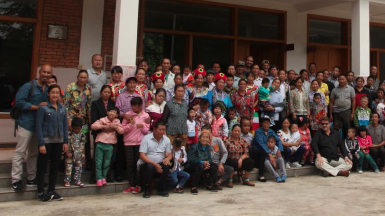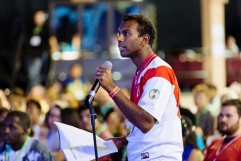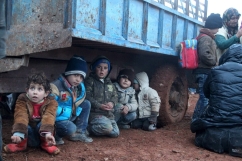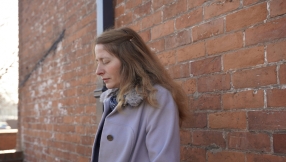
Robert Glover has a vision to see a million children moved from institutional care into families. I'm normally sceptical about huge numerical targets but Glover is over a third of the way there already. An estimated 300,000 children in countries like China and Thailand have been taken out of orphanages and placed into the care of local families. He and his team at Care for Children achieved this by entering highly strategic and effective partnerships with national and local governments to train orphanage staff, repurpose their buildings, and move towards family-based care in their local communities. Leaving his career as a Social Worker in the UK to move to China with his wife, Elizabeth, and their six children in 1998, Glover has been spreading his vision for 17 years. I met him at a global consultation that in Thailand on caring for vulnerable children in order to pass on the wisdom he had picked up through his life's work.
One of Glover's favorite stories is the huge impact of a small Chinese village called Yang Jia where 53 families have fostered 166 children! As if that is not remarkable enough, all of these children had complex special needs.
Through Home for Good we have been working hard to find foster carers and adopters in the UK. Many Christians have told me that they would love to foster but they can't afford it, don't have enough room in their homes or haven't got the time. All of which are totally understandable reasons. Almost all of the children in foster care in the UK have experienced neglect or abuse and need foster parents who will make space in their homes and lives to put them first, understanding that it is a costly exercise emotionally and practically with only a small remuneration to help cover expenses. I hope that Glover's story from China will set a new challenge to all of us:
Last September Glover took American author and preacher Francis Chan to China to see the remarkable Yang Jia village in the mountains near Kunming. Chan was visibly moved by the trip and commented: "I have been a lot of places around the world and I don't know that I have met a more beautiful group of people." 99 per cent of the village is Christian and the villagers talk about the children they have taken in from the orphanage as a gift from God. Glover describes Yang Jia as a city on a hill not a village on a mountain - he has seen the effect it has had like a lamp on a stand that shows something of the glory of God to the watching nations.
The hospitality of Yang Jia demonstrates three things for me:
Firstly, the value of family care trumps institutional care. No matter how good an orphanage is it cannot give the same love and care that a family can provide. I am yet to meet a young person who has told me that they would prefer to have grown up in an orphanage. Well-meaning Christians are still building orphanages around the world but the best research points to the superiority of family-based care like fostering and adoption.
Secondly, family care trumps the popular model of children's villages. Maybe you have seen initiatives to look after orphaned or vulnerable children in compounds where foster or housemothers are paid to look after them on the campus as a job. At the end of their shifts they go home to their own families. Yang Jia is not that model. It is a normal village where normal families have expressed an exceptional level of hospitality. The children in Yang Jia receive unconditional love and attention as full members of genuine families and as part of a wider ordinary community. This makes transition to adult life a lot easier, and gives these children much better training should they go on to have families of their own, because they have had family life modeled to them. In other countries the scale of the AIDS epidemic or poverty is so widespread that it may seem that family-based care is not possible. However Yang Jia village is an example of a place that challenges that view by the sheer numbers involved. Even with only 53 families they have expanded their homes rather than set up structures and systems that are really just another form of institutional care.
Thirdly, Yang Jia village offers a powerful alternative to transnational adoption. These children are not being removed from the culture in which they have grown, from the possibility of contact with extended family, or even the possibility of family reunification in the future. As they grow up in separate families, but in the same community, these children have a shared history which is a valuable asset as they grow older and learn to make sense of their life stories. The foster families too, with their shared joys and challenges, can encourage and support one another. Through this model of local fostering and adoption there is every reason to expect better long-term outcomes for children.
Robert Glover is an impressive man. Helping to change the orphanages of China has been his life's work and my prayer is that his story can inspire us to change the lives of children in institutions around the world. I share his vision that one day no child would have to grow up in an orphanage or children's village but would instead know the care and attention of their own loving family.
Dr Krish Kandiah is a Contributing Editor to Christian Today and founder and director of Home for Good.
















